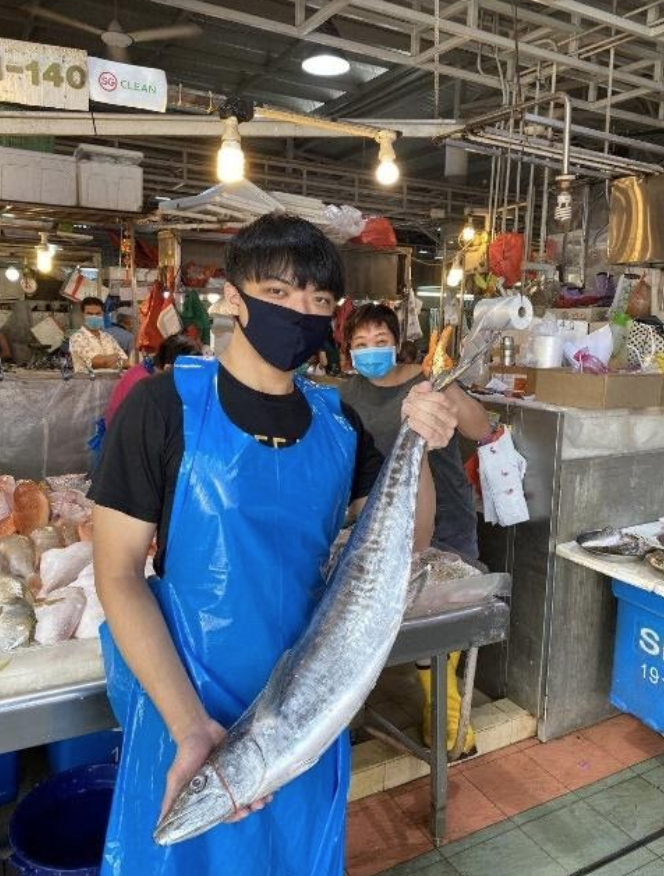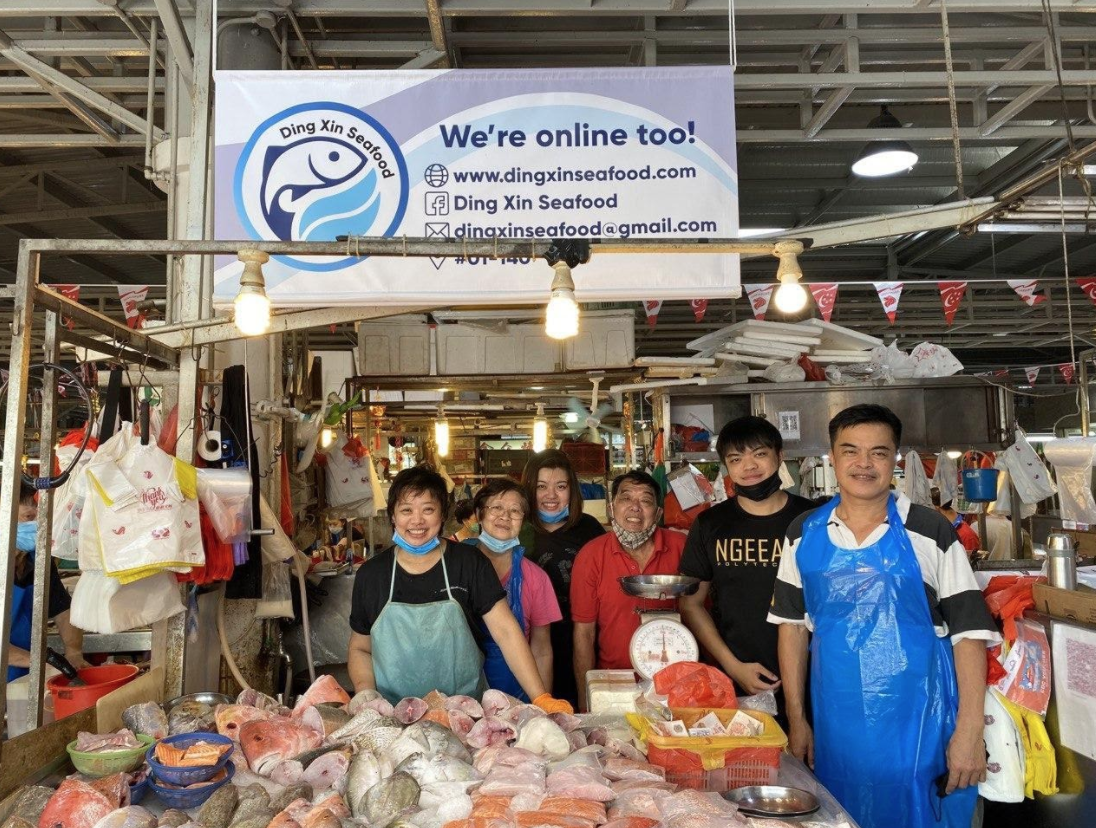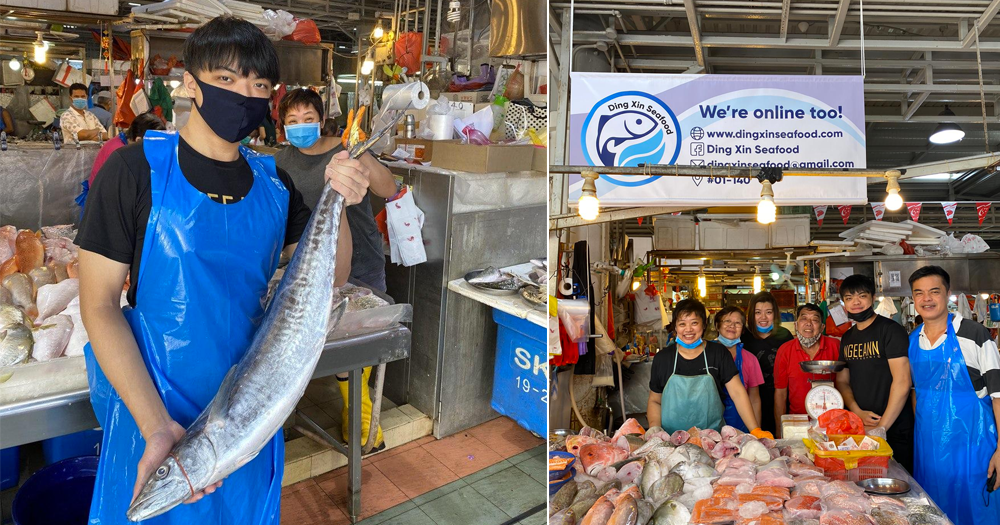COMMENTARY: 19-year-old Xavier Ng writes about his experience helping out at his mother's fish stall at the wet market as well as the challenges they faced during the Covid-19 period.
Ng, who recently graduated from Ngee Ann polytechnic and is currently awaiting enlistment, helped move the business online after seeing their revenues dip during the Covid-19 period.
By Xavier Ng, 19
The last few months have probably been the most meaningful, difficult, yet exciting few months of my life so far.
I studied Hotel & Leisure Facilities Management and recently graduated from Ngee Ann Polytechnic earlier this year.
While waiting to be enlisted, I spent the last four months helping out at my mother’s fish stall almost every single day.
 Photo by Xavier Ng.
Photo by Xavier Ng.
I first started helping out when I was in secondary school several years ago, and dreaded doing so because the work was so exhausting.
However, after the first month of my polytechnic internship in 2019 when I received my first pay cheque, it dawned on me that money does not come easy. It also made me think about my mother, who had tirelessly worked at the wet market stall for over a decade.
And yet, I’d never once asked her if she was tired from work.
It hurt to know that she had been shouldering such a huge burden for so long, and never once complained.
Ever since then, I had been helping out at her stall every weekend (well, almost every weekend) until I became a full-timer.
Wet market life is so much more than I thought, and I have learned so much from running the business.
How has Covid-19 changed wet markets?
The wet market I work at (505 Jurong West St 52) was one of the popular markets that had restrictions imposed (the odd/even number IC) to curb the crowds.
On the first day, I remember seeing metal barriers erected at every single entrance except for one that was designated as the main (and only) entrance. There was a long queue of elderly customers outside, with some even berating the safe distancing ambassadors due to the confusion and chaos.
It was my first time seeing an empty wet market at 6 am, but it certainly would not be my last.
We were grateful that we could still operate since we were counted as essential services, but revenue, unfortunately, did not translate to earnings – we could very well be bearing losses if our expensive items did not sell, for instance.
During the circuit breaker period, revenue fell by at least 75 per cent. And this was at a popular wet market, mind you – I can only imagine what it was like for stallholders in other places.
Why the significant drop in revenue? I thought of two possibilities: People could be turning to supermarkets for their groceries, or even getting them online.
How my family coped with the challenges: Moving online
Thankfully, we had support from the government, with rental waivers, generous cash payouts to tide us through this rough period.
But we also had to adapt to the times.
In the first week, I thought to myself: Wouldn’t it be good if I could deliver seafood to my cousins who lived in the east? After all, they never came by only because we were so far.
Hence, I thought of a possible solution to our dipping revenue: moving the business online.
I spent April taking pictures of our fish, learning about them in detail and working out how to deliver seafood to the rest of Singapore.
My mother would prepare the fish, I would attend to the customer queries on online platforms, my dad and my grandfather, as a former taxi driver and driver with 50 years of experience respectively, would plan out the delivery routes and make the deliveries.
I started a Facebook page for my mother’s stall, but creating our own website wasn’t so straightforward. Other than creating my digital portfolio in my polytechnic days, I had never done anything like it, but I eventually managed to cobble something together.Business didn’t pick up right away
We got off to a rocky start initially, relying on orders via word of mouth from family and friends, or friends of family, in May.
I tried putting up Facebook ads, spending a couple of dollars a day to get some likes on our page, but they never brought in any new orders.
Then, I found a Facebook group called Hawkers United that led me to another group called Pasar United. I posted in these groups repeatedly, hoping that it would catch some attention.
After a few weeks of trying, we finally had one post that gained traction. And that’s when orders came flooding in.
The importance of being attentive to the needs of customers
From my time helping out at the stall, I noticed how my mother would remember what her regular customers want, without them even asking. During the Lunar New Year period, for instance, I witnessed how she remembered what a customer liked, even though they only came by occasionally during special occasions.
By giving them valuable advice on how to choose fish and paying attention to their needs, she taught me a very important lesson – a satisfied customer is the best source of advertisement.
 Photo by Xavier Ng.
Photo by Xavier Ng.
This inspired me to contact each customer a week after their purchase in order to accumulate customer reviews on our Facebook page, since reviews are what many look out for when deciding whether to make purchases.
Through my interactions with customers, I learnt that many of them had never been to a wet market, or weren’t regular visitors of wet markets at all.
However, they appreciated the convenience of getting seafood delivered to their doorstep at competitive prices. Many also offered words of encouragement and advice.
One in particular, whom I later learnt was an F&B consultant, even kindly gave me tips on how to improve efficiency of our delivery systems.
Importance of staying relevant
Compared to the peak in our sales since we moved online, business has slowed down since phase 2 started. But this is understandable since many of our customers’ families have been eating out more frequently instead of cooking at home like they used to.
Nevertheless, in the past few months, it is heartening to see that many people are willing to support hawkers and wet market stall holders, especially since the livelihoods of many Singaporeans are at stake.
Getting your groceries from a local wet market not only potentially helps you save on grocery expenses, but also allows you to show your support for our local hawkers.
But above all, this experience has taught me that Singapore’s wet markets need help with digitalisation to stay relevant in this Covid-19 world.
My goal during and after my enlistment is to help more stalls in the Jurong West 505 wet market go digital, and hopefully allow my mother and grandmother to retire early.
Growing as a person
I have grown as a person from helping out at my mother’s stall during this Covid-19 period.
Many things I used to spend time and money on, like gaming for instance, have become less important to me. Instead, I have learnt about the value of hard work, constantly trying new things and not being afraid of failure.
I’ve made many friends from working at the wet market who have helped me to mature as a person because they are far older and wiser than I am. They would also look out for me by reminding me to rest well and take care of my health.
But above all, this experience has helped me become a better son as I grew closer to my mother (now, she feels like a best friend!) and other family members.
Through all the ups and downs, driving around Singapore as a family, delivering fish and singing songs in the car together, my family has become much closer.
And while I have a long way to go, I am very thankful to have experienced so much in the span of a few months.
Have an interesting perspective to share or a commentary to contribute? Write to us at [email protected].
Top photo courtesy of Xavier Ng.
If you like what you read, follow us on Facebook, Instagram, Twitter and Telegram to get the latest updates.
